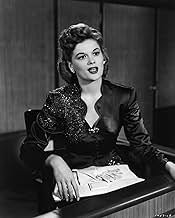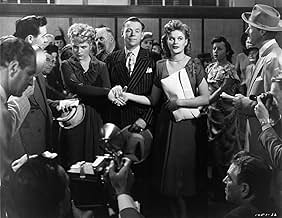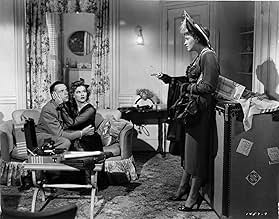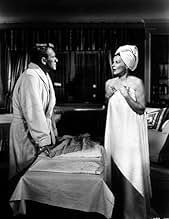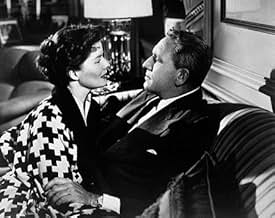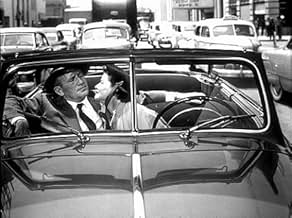IMDb RATING
7.4/10
24K
YOUR RATING
Domestic and professional tensions mount when a husband and wife work as opposing lawyers in a case involving a woman who shot her husband.Domestic and professional tensions mount when a husband and wife work as opposing lawyers in a case involving a woman who shot her husband.Domestic and professional tensions mount when a husband and wife work as opposing lawyers in a case involving a woman who shot her husband.
- Nominated for 1 Oscar
- 3 wins & 5 nominations total
Edward Andrews
- Kip's neighbor
- (uncredited)
Bonnie Bannon
- Woman in Courtroom
- (uncredited)
Charles Bastin
- Young District Attorney
- (uncredited)
Harry Baum
- Commuter
- (uncredited)
Joseph E. Bernard
- Mr. Bonner - Adam's Father
- (uncredited)
- Director
- Writers
- All cast & crew
- Production, box office & more at IMDbPro
Featured reviews
Not as dramatic, engaging or funny as has been suggested but the lead pair make it well worth seeing
Adam and Amanda Bonner are happily married, despite the sparky nature of their relationship. Lawyers each, both are interested in a newspaper report of a woman who shot (but not killed) her husband when she discovered him in the arms of another woman. The Bonner's take differing views of the case and it is no surprise that Adam ends up prosecuting while Amanda is Doris Attinger's defence counsel. With the gloves off in the courtroom with a legal battle of sexual equality, it is no surprise that the conflict and disagreements don't end at the front door and soon it is all kicking off.
The issue of sexual equality may have moved on from where it was in the middle of the last century but this film occasionally hits an interesting point, even if the majority of it is fairly shallow and a bit unconvincing in terms of legal argument. Without really engaging me, the film still held my interest as the story developed and it was fairly enjoyable even if it couldn't settle on whether or not it is a comedy or a courtroom "issue" drama; as it was I didn't think it did either brilliantly but did both well enough to make it work. I did expect more laughs because I thought it was going to be one of the screwball genre, but once I realised that it was more amusing than funny then I was able to settle into it.
One of the main reasons that the film has continued to last down the years is the chemistry between Tracy and Hepburn. Both are convincing as a couple in terms of romance, attrition, chemistry and other aspects of their relationship on screen. Tracy is tetchy and enjoyable but Hepburn is more than a match for him and she does it with style and real humour. Support is good from Holliday as well as Wayne's annoying neighbour. Mainly though it is Tracy and Hepburn's movie and they more than carry it between them.
Overall though this is not quite the classic that I had hoped it would be but it still did enough to make it work today. The courtroom stuff is not as dramatic or as relevant as it may have once been and the comedy is more of the sharp variety than the laugh-out-loud sort; however the chemistry between the lead two keeps it going and makes it worth seeing still.
The issue of sexual equality may have moved on from where it was in the middle of the last century but this film occasionally hits an interesting point, even if the majority of it is fairly shallow and a bit unconvincing in terms of legal argument. Without really engaging me, the film still held my interest as the story developed and it was fairly enjoyable even if it couldn't settle on whether or not it is a comedy or a courtroom "issue" drama; as it was I didn't think it did either brilliantly but did both well enough to make it work. I did expect more laughs because I thought it was going to be one of the screwball genre, but once I realised that it was more amusing than funny then I was able to settle into it.
One of the main reasons that the film has continued to last down the years is the chemistry between Tracy and Hepburn. Both are convincing as a couple in terms of romance, attrition, chemistry and other aspects of their relationship on screen. Tracy is tetchy and enjoyable but Hepburn is more than a match for him and she does it with style and real humour. Support is good from Holliday as well as Wayne's annoying neighbour. Mainly though it is Tracy and Hepburn's movie and they more than carry it between them.
Overall though this is not quite the classic that I had hoped it would be but it still did enough to make it work today. The courtroom stuff is not as dramatic or as relevant as it may have once been and the comedy is more of the sharp variety than the laugh-out-loud sort; however the chemistry between the lead two keeps it going and makes it worth seeing still.
(Note: Over 500 of my movie reviews are now available in my book "Cut to the Chaise Lounge or I Can't Believe I Swallowed the Remote!" Get it at Amazon.)
Two New York lawyers, husband Adam Bonner (Spencer Tracy) and wife Amanda Bonner (Katharine Hepburn), work out the marital tension and fight the sexual wars in the courtroom on opposite sides of a wife (Judy Holliday) shoots cheating husband (Tom Ewell) case. Adam's masculinity is seemingly challenged and his sense of justice offended by his wife's insistence on showing how smart she is while furthering her feminist agenda at the expense of the law. Will their public confrontation destroy their marriage, or will it ultimately make the bond stronger?
This still plays mainly because of the charisma of Hepburn and Tracy and the fine chemistry they create together. The script by Garson Kanin and Ruth Gordon is shallow and profound by turns, yet ultimately witty and pleasing. Judy Holliday as the lower middle-class Doris Attinger (on her way to her signature role in Born Yesterday (1950)) and David Wayne, as the song-writing neighbor who adores Amanda, shine in supporting roles. George Cukor's direction is clear, crisp and always focused. In the end we can see that Adam can be as feminine as Amanda can be masculine. The bit where Tracy cries real tears to win her back and then tells her, "We all have our tricks" is classic. It's his clever answer to her outrageous courtroom theatrics. Memorable as it illuminates their contrasting personalities is the early scene where the unsophisticated Doris is interviewed by Yale law school grad Amanda.
As a political movie, was Adam's Rib ahead of its time as a vehicle for feminist expression, or was it just another apology for male chauvinism, or was it balanced and fair? I'll give you a hint: the title is ironic. One of the things that made the Tracy/Hepburn romance work so well for so long was the creative balance they maintained in the battle of the sexes. The script by Kanin and Gordon carefully continues that profoundly true equilibrium.
Two New York lawyers, husband Adam Bonner (Spencer Tracy) and wife Amanda Bonner (Katharine Hepburn), work out the marital tension and fight the sexual wars in the courtroom on opposite sides of a wife (Judy Holliday) shoots cheating husband (Tom Ewell) case. Adam's masculinity is seemingly challenged and his sense of justice offended by his wife's insistence on showing how smart she is while furthering her feminist agenda at the expense of the law. Will their public confrontation destroy their marriage, or will it ultimately make the bond stronger?
This still plays mainly because of the charisma of Hepburn and Tracy and the fine chemistry they create together. The script by Garson Kanin and Ruth Gordon is shallow and profound by turns, yet ultimately witty and pleasing. Judy Holliday as the lower middle-class Doris Attinger (on her way to her signature role in Born Yesterday (1950)) and David Wayne, as the song-writing neighbor who adores Amanda, shine in supporting roles. George Cukor's direction is clear, crisp and always focused. In the end we can see that Adam can be as feminine as Amanda can be masculine. The bit where Tracy cries real tears to win her back and then tells her, "We all have our tricks" is classic. It's his clever answer to her outrageous courtroom theatrics. Memorable as it illuminates their contrasting personalities is the early scene where the unsophisticated Doris is interviewed by Yale law school grad Amanda.
As a political movie, was Adam's Rib ahead of its time as a vehicle for feminist expression, or was it just another apology for male chauvinism, or was it balanced and fair? I'll give you a hint: the title is ironic. One of the things that made the Tracy/Hepburn romance work so well for so long was the creative balance they maintained in the battle of the sexes. The script by Kanin and Gordon carefully continues that profoundly true equilibrium.
'Adam's Rib' is arguably the greatest Tracy-Hepburn film, and is certainly the most popular of their teamings. Brightly written (by the husband and wife team of Ruth Gordon and Garson Kanin), it takes the premise of a wife (the sparkling Judy Holliday, in her film debut) on trial for shooting her unfaithful husband (Tom Ewell, establishing himself in the kind of role he'd reprise in The Seven-Year Itch), and turns it into a forum of the sexual values and standards of the 1940s, and a showcase for the fabulous Tracy and Hepburn, who were were never better than as the battling D.A. and defense attorney. In the courtroom and out, the love they share, and tweaking of each other's egos is a sheer joy to watch. That the story is also a knowing commentary about women's inequality under the law makes the film even more topical today, and doesn't reduce the film's enjoyment value at all. It is a VERY funny film, and can be enjoyed at MANY levels!
In addition to Holliday and Ewell, the supporting cast includes the terrific David Wayne as a smarmy songwriter-neighbor who covets Hepburn, and 'writes' the ditty 'Goodbye, Amanda' for her (actually composed by Cole Porter, Hepburn's character's name in the film was changed to Amanda, to fit the song!)
Among the many wonderful scenes of the film are the 'home movie', which accurately reflected much of Tracy and Hepburn's own relationship; the infamous massage scene ("I know a slap...!"); the circus 'Strong Woman', demonstrating that women can be as physically powerful as men by lifting the panicking Tracy over her head easily (in the middle of the courtroom!); the infamous licorice-gun confrontation as Tracy confronts Hepburn with Wayne; and Tracy's crying-on-demand revelation.
'Adam's Rib' is a film which never seems to age, but just gets better and better!
In addition to Holliday and Ewell, the supporting cast includes the terrific David Wayne as a smarmy songwriter-neighbor who covets Hepburn, and 'writes' the ditty 'Goodbye, Amanda' for her (actually composed by Cole Porter, Hepburn's character's name in the film was changed to Amanda, to fit the song!)
Among the many wonderful scenes of the film are the 'home movie', which accurately reflected much of Tracy and Hepburn's own relationship; the infamous massage scene ("I know a slap...!"); the circus 'Strong Woman', demonstrating that women can be as physically powerful as men by lifting the panicking Tracy over her head easily (in the middle of the courtroom!); the infamous licorice-gun confrontation as Tracy confronts Hepburn with Wayne; and Tracy's crying-on-demand revelation.
'Adam's Rib' is a film which never seems to age, but just gets better and better!
Spencer Tracy and Katharine Hepburn worked so smoothly together that it's almost difficult to fault their films. Hepburn's admiration for Tracy off-screen is hard to ignore, but she was a character actress first and foremost (and THEN a movie star), and she's deeply in character here and believable. Tracy, on the other hand, took movie-making with a grain of salt--we don't see his indifference, but we do see his casual 'naturalness,' his underplaying. Spencer Tracy overacts at underplaying, mumbling some of his throwaway lines for effect or overlapping Hepburn's dialogue with his. This non-effort actually shows effort, and turns this comedy into an actor's exercise. It's not very funny anyway: married lawyers take opposite sides of a spousal-abuse case. Dated battle-of-the-sexes doesn't give Judy Holliday much to work with (word has it this was her screen-test for "Born Yesterday"). It's all very smart and sophisticated on the surface, but callow at its core. Screenwriters Ruth Gordon and Garson Kanin received Oscar nominations for their script, which disintegrates into door-slamming farce. ** from ****
10Cinemayo
Spencer Tracy and Katharine Hepburn make fireworks in this cute film about a well-to-do married couple who both happen to be lawyers. Hepburn is a die-hard Woman's Rights supporter, so when a ditzy lady is charged with shooting her husband after catching him being unfaithful, Kate decides to take her case and defend her. The trouble is, old-fashioned husband Tracy is already penciled in as the prosecuting attorney. Let the Battle of the Sexes begin!
The script sets up a great opportunity to have Tracy and Hepburn sparring with one another during every phase of the trial, as well as at home every night after they've spent each day trying to outwit each other. As a comedy, there aren't any huge belly-laughs, but it's a charming enough little take on the differences between men and women which also manages to make the point that, in many ways, the sexes aren't really all that different when all is said and done.
**** out of ****
The script sets up a great opportunity to have Tracy and Hepburn sparring with one another during every phase of the trial, as well as at home every night after they've spent each day trying to outwit each other. As a comedy, there aren't any huge belly-laughs, but it's a charming enough little take on the differences between men and women which also manages to make the point that, in many ways, the sexes aren't really all that different when all is said and done.
**** out of ****
Did you know
- TriviaInspired by the real-life story of husband-and-wife lawyers William Dwight Whitney and Dorothy Whitney, who represented Raymond Massey and his ex-wife Adrianne Allen in their divorce. After the Massey divorce was over, the Whitneys divorced each other and married the respective Masseys.
- GoofsDuring the trial proceedings, a Black juror was in the first row, but the trial scene following the argument between Amanda and Adam where Adam walks out of the home, the jury makeup has now changed and the Black juror is not present. However the following day when court resumes for the jury verdict, the Black juror is back in the jury box.
- Crazy creditsOpening credits are little curtains that go up and down, on a stage in a performance hall.
- Alternate versionsAlso available in a computer colorized version.
- ConnectionsEdited into Hollywood: The Dream Factory (1972)
- SoundtracksFarewell, Amanda
(1949)
Music and Lyrics by Cole Porter
Played during the opening credits and often in the score
Sung by David Wayne (uncredited), accompanying himself on the piano
Reprised by the voice of Frank Sinatra (uncredited) on the radio
Whistled by Katharine Hepburn (uncredited)
Sung a cappella by Spencer Tracy (uncredited)
Details
- Runtime1 hour 41 minutes
- Color
- Aspect ratio
- 1.37 : 1
Contribute to this page
Suggest an edit or add missing content

Top Gap
By what name was Madame porte la culotte (1949) officially released in India in English?
Answer


